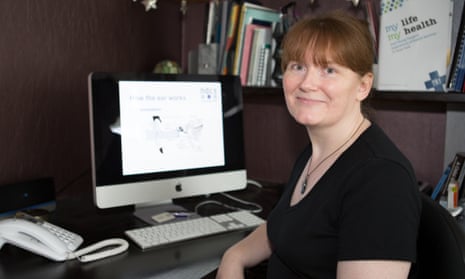My day starts at 7am. Over breakfast I check my emails and scour Twitter, Facebook and news feeds for any questions that need answering, publications or news on the latest developments in audiology.
I am a home worker and spend most of the morning responding to online questions or requests for information from families. These will typically include a parent wanting to know the pros and cons of choosing grommet surgery or temporary hearing aids to treat glue ear, or the best technology for everyday things that most parents take for granted, such as communicating with a deaf child who is learning to ride a bike.
I trained as an audiologist straight from school 25 years ago and joined National Deaf Children’s Society (NDCS) as a specialist audiology adviser in 2004. The charity helps deaf children and their families by offering impartial, practical and emotional support, as well as challenging the government to improve services for the 45,000 deaf children in the UK.
Audiologists are responsible for testing hearing and balance, fitting and maintaining hearing aids and providing support for children and families living with deafness. Audiology has changed a huge amount during my career and all of us working in the field have to work hard to keep up with technological developments.
The job can be very emotionally draining, especially when speaking to families who have just found out their baby is deaf. Ninety per cent of deaf children are born to hearing parents. Many families find the diagnosis a shock and don’t take in all the information they’re given at the hospital. I’m able to offer a supportive environment where they can talk through their concerns and questions, which range from needing to understand what their child can hear, to the practicalities of keeping hearing aids fitted on babies.
I also work closely with families who are struggling to get answers about why their child is deaf, or who haven’t experienced the best care. While I don’t have all the answers I’m able to give unbiased advice based on the technology and services available. Some of the feedback I get from families I’ve worked with gives me a great sense of job satisfaction. Recently, one mum reported that after speaking to me she persuaded the audiology department her daughter was attending to let her trial a new type of hearing aid. Her daughter had always refused to wear hearing aids but she is now happy to wear this one most of the day and it’s really helping. It’s feedback like this that really makes my job worthwhile.
I’m fortunate to live opposite a large park and try to grab some fresh air and a walk there at lunchtime. After lunch and as the afternoon unfolds, I get the chance to catch up with colleagues who have asked for information or assistance. I work closely with the policy and communications team at head office, who liaise with me when deciding on the charity’s response to emerging issues. This includes things such as this week’s Ear Foundation report, which looks at the impact of mild to moderate deafness on education and development.
I research advances in technology such as hearing aids and cochlear implant processors. I also spend time writing patient information leaflets and preparing training sessions for parents and NDCS colleagues. Far too many cups of tea fuel me through the day but are a good excuse to take a break from the computer screen.
On occasion, I might spend the day away from home, meeting with the Department of Health or a group of leading professionals to discuss writing new standards for audiology services. It’s about a 20-minute walk to the station but I prefer to travel by train than car as it gives me the chance to catch up on reading during the journey.
I try to finish promptly at 5pm as I run a Rainbow and Brownie pack in the early evenings. I also support other volunteer Girlguiding leaders as a division commissioner. I love being able to give something back after getting so much out of Guiding myself as a child. I get so much enjoyment from the friendships made, fun adventures, opportunities for travel and learning and development. I’d find it hard to give it all up for a quiet life.
For more information about the National Deaf Children’s Society, click here.
If you would like to be featured in our “Day in the life of...” series, or know someone who would be great to include, please email healthcare@theguardian.com
